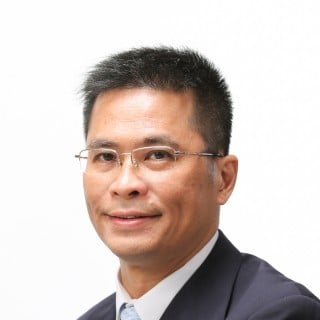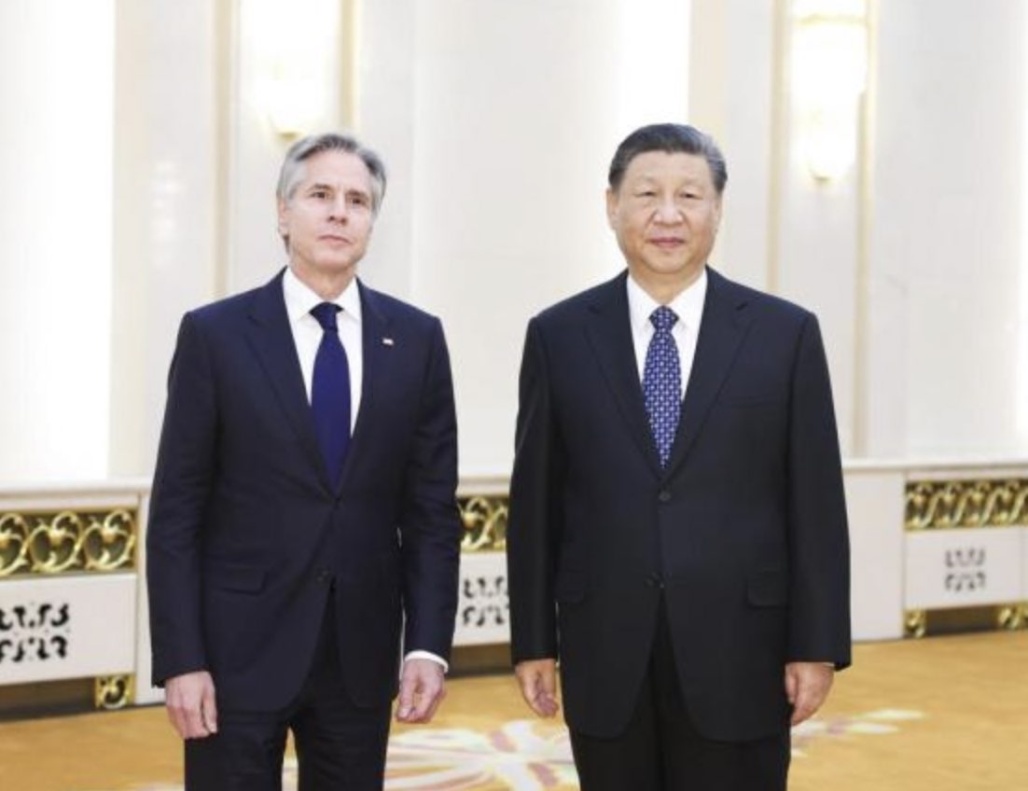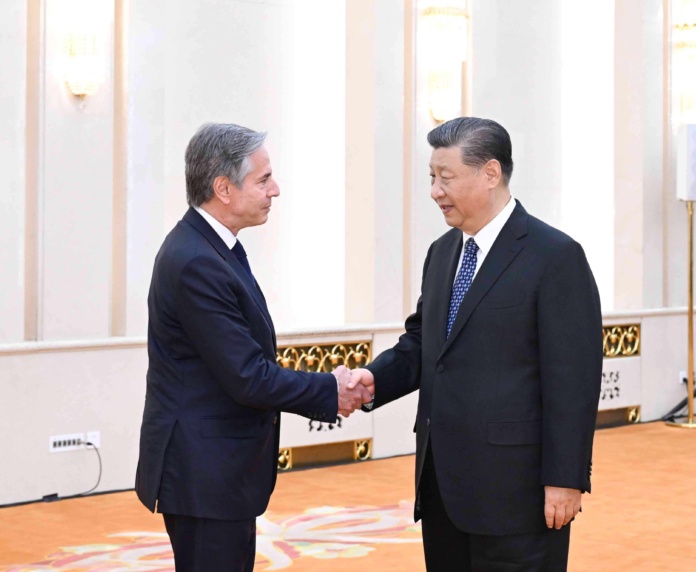The three-day visit of US Secretary of State Antony Blinken to China from April 24 to April 26 and his meetings with Chinese Foreign Minister Wang Yi and President Xi Jinping demonstrated the emergence of a new Sino-US diplomacy of managing their divergent views over a multiplicity of issues, ranging from issues of “low-level” politics that can reach consensus to issues of “high-level politics” that necessitate reiterations of their positions rather than a search for immediate solutions.

Blinken’s visit to China was originally handled by the Chinese side in a low-key manner, but his eventual meetings with President Xi Jinping demonstrated a unique Chinese way of managing his visit in an increasingly politically important manner as time passed from April 24 to April 26—an implication that Beijing handles its relations with Washington from an approach of relative coolness to one of increasing warmness. On April 24, when Blinken arrived in Shanghai, he was received at the airport by the Shanghai city’s foreign affairs office director, unlike Blinken’s last visit to China, when he was greeted by an official dealing with American affairs in the Foreign Office. It looked as if the official nomenklatura of the Chinese official greeting him this time when he stepped down from the plane was comparatively lower than his last visit—perhaps an implicit message that Sino-US relations deteriorated from June 2023 to the present. Such a deterioration of Sino-US relations could also be seen in the remarks of Wang Yi to Blinken on April 26, when Wang commented that “the negative factors shaping Sino-US relations are still ascending and aggregating.”
Most interestingly, during the meeting with Blinken, President Xi Jinping was sitting in the middle of the long table, whereas the American delegation led by Blinken sat on his right-hand side, with Blinken listening and speaking to Xi, and both were shown standing side by side in an official photo. The CCTV news also showed that Xi and Blinken shook hands for one second this time, unlike the two seconds last time when Blinken visited China in June 2023. From the perspective of political symbolism, the phenomenon of President Xi sitting in the middle refers to the position of China as a host, with the president’s status naturally much higher than that of the US Secretary of State. From another perspective, China remains a self-confident country without any need to, unlike the weak Qing dynasty in Chinese history under the onslaught of foreign imperialism, “kowtow” to any foreign power. Instead, China, under the leadership of Xi remains not only self-confident but also insistent on its principles on foreign relations.
As such, President Xi Jinping’s remarks to Blinken were politically important. He said that both China and the US should be partners rather than competitors. Both countries, Xi said, should make mutual achievements instead of harming each other, and both countries should also trust their words and take actions to have fruitful results rather than saying one thing but doing another matter at the same time. Xi’s comments here were direct criticisms of US foreign policy towards China, saying that the US should not treat China as a competitor but as a cooperative partner. The comments on the US action as not conforming to its words implicitly refer to the US foreign policy on not only Taiwan – as Wang Yi repeated that Taiwan remains a red line that the US should not cross—but also trade matters in which the US has recently taken action to struggle with China.
Interestingly, President Xi spoke in a relatively serious tone and at a at a slow pace, as shown in the TV news, implying perhaps an indication that the top Chinese leader was voicing his heartfelt views and giving his solemn advice to the top US diplomat on the topic of Sino-US relations.
Wang Yi, during his meeting with Blinken, explicitly said that the Chinese people’s developmental rights should not be exploited, and that Chinese technology should not be “suppressed.” Wang argued that on trade issues, both countries should have fair competition rather than suppression and containment from the other side. Moreover, he hoped that the US side should stop “cooking up” the “fake story” of China’s “excessive industrial capacity”—an i indirect and unnamed criticism of Janet Yellen’s emphasis on Beijing’s “excessive industrial capacity” during her recent visit to China. Wang also urged the US side to repeal the “illegal” sanctions imposed by the US on Chinese enterprises and to stop levying tariffs on Chinese goods.
On April 18, US President Joe Biden called for the existing tariff rate on Chinese steel and aluminium to be tripled as the US Trade Representative’s office announced the launch of another Section 301 investigation into China’s maritime, logistics, and shipbuilding sectors. The investigation was a response to a petition by five US national labour unions accusing China of utilising “unfair, non-market policies and practices” to dominate the maritime, logistics, and shipbuilding sectors. During a visit to the swing state of Pennsylvania, Biden told a group of steelworkers that the Chinese are “not competing” but “cheating (South China Morning Post, April 22, 2024, p. A1).” Wang Yi’s comments on the US tariffs could be seen as a reaction to the US move to enhance the tariff rate on Chinese steel and aluminium.

On the matter of Taiwan, Wang Yi’s remarks were politically very explicit. He emphasised that while Taiwan is a politically red line that the US side should not cross, the US should stop arming Taiwan and the US should support China’s peaceful reunification. If President Xi mentioned to President Joe Biden the US action of arming Taiwan in the San Francisco meeting, then what Wang Yi said during his meeting with Blinken was not only a reiteration of the Chinese position, but also an implication that, if mainland China and Taiwan may have any political dialogue in the future, the prospects of US arms sales to Taiwan will likely be a matter of negotiation that will necessitate US consideration and Beijing-Washington discussions.
What perhaps stimulated the Chinese side shortly before the Blinken visit to China was that hours before Blinken landed in Shanghai, President Biden signed a bipartisan bill that included billions of dollars in defence aid for Taiwan. The US weapons supply to Taiwan remains a thorn in US-China relations, but from Washington’s perspective, it is necessary for Taiwan to “deter” the Chinese military threat.
Wang Yi’s comments on US foreign policy towards Asia were noteworthy. He remarked that the US side should abandon the policy of creating “small circles” in the Asia-Pacific region, that the US should not force other countries in the region to take sides, and that the US should not station and deploy medium-range missiles in Asia.
Wang’s remarks above showed that China is unhappy with the US military moves in strengthening its alliance in the Asia-Pacific region, including the recent news that Japan is going to join the AUKUS, a trilateral security partnership for the Indo-Pacific region between Australia, the UK, and the US that was established in September 2021. Canada is also considering the enhancement of its submarines in response to the activities from China and Russia in the North Pole. On April 24, Chinese Defence Ministry spokesman Wu Qian said that China paid attention to all these moves, expressed its grave concern, and opposed any move to create bloc confrontation and splittist tendencies. Wu also said that the Asia-Pacific region should not become a geopolitical rivalry centre and that the actions of the US, UK, and Australia are challenging the peace and stability of Asia. Hence, Wang Yi’s remarks to Blinken could be seen as a reiteration of the comments made by Wu Qian.
According to Yonhap News Agency, the US is considering the addition of South Korea, Canada, and New Zealand as the new partners to ANKUS plus Japan. If so, a technological and military alliance led by the US will consolidate its alliance in the Asia-Pacific region, apart from a recent report saying that the US is going to deploy and station medium range missiles in Luzon of the Philippines. The Sino-Philippine disputes over the islands and reefs in South China Sea have already propelled the military alliance between Manila and Washington, and between Manila and Tokyo, making Beijing feel that the US together with Japan’s support are enhancing their military “containment” policy toward China, although the US side has consistently denied it adopts any “containment” approach.
Indeed, the geopolitical and military tensions in Asia are rising. North Korean leader Kim Jong Un has recently inspected the tests for a new rocket that could be used to attack Seoul in South Korea and that could assist Russia in its war against Ukraine. The 240-millimeter multiple rocket launcher has an estimated range of 40 kilometres and 60 kilometres. If so, it is natural that the US and its allies have been enhancing their military cooperation, cooperation, and preparedness, especially Japan which is worrying about the North Korean military capabilities and whose rearmament is rapid with the explicit US support. Despite all these military moves, the Chinese and American sides have engaged each other with dialogue in the 19th Western Pacific Naval Symposium in Qingdao on April 23 in which the Chinese side appealed to 22 member states and 7 observer states to enhance communications, increase cooperation, promote development, and protect naval safety and ocean well-being (Oriental Daily, April 25, 2024, p. A17).
The Blinken visit to China does have some achievements in managing divergence between Washington and Beijing. Both sides reached a five-point consensus. First, both sides continue to implement the directives from the chief executives of the two countries to stabilise and develop Sino-US relations based on the consensus from the San Francisco meeting. Second, both sides agree to maintain high-level interactions and talks at various levels of the government, and to continue to utilise diplomatic, economic, monetary, and commercial mechanisms. Third, both sides agree to adopt Artificial Intelligence in their first government-to-government meeting and to propel the development of Sino-US dialogue on Asia-Pacific affairs, ocean affairs, and the discussions between their embassies. The Sino-US working group against narcotics will hold a high-level meeting, and the US side will welcome Chinese climate change envoy Liu Zhenmin to visit the US. Fourth, both sides will expand the exchange of people in the humanities and educational sectors, welcoming the arrival of more exchange students and organising a high-level Sino-US tourist dialogue in the city of Sian in May. Fifth, both sides will send envoys to enhance their communications over the hot spots internationally so that mutual consultation will persist.
The five-point consensus above shows how the US and China manage the ideological, military, and political divergence in a diplomatic manner. By dealing with issues of low-level politics, such as anti-narcotics, climate change, and educational and personnel exchanges, Sino-US relations can be improved at least slightly than ever before. Moreover, continuous dialogue over a whole range of issues, including the contentious hot spots, will be conducive to the management of not only divergence but also the possibilities of sudden conflicts and military crises. As Antony Blinken told Xi Jinping during their meeting, both sides can minimise misperceptions, miscalculations, and misunderstandings through face-to-face meetings at the high level—perhaps a move setting a precedent for the ongoing US-China relations regardless of whether Donald Trump may return to presidential power in the upcoming US presidential elections.
Blinken also brought up some issues of US concern during his meetings with the Chinese side, including the concern about Chinese logistical supplies to the Russian military infrastructure, and the question of so-called Chinese “intervention” in US elections. Perhaps the two issues above could not be expected to achieve any significant and immediate breakthrough. Nevertheless, Blinken wisely brought with him officials who could communicate with their Chinese counterparts on issues that can improve US-China relations at the operational level. Todd Robinson, Assistant Secretary of State for International Narcotics and Law Enforcement Affairs, and Nathaniel Fick, ambassador-at-large for cyberspace, were among the officials accompanying Blinken’s visit.
In conclusion, the Blinken visit to China and his talks with Wang Yi and President Xi showed that both the US and China have been managing their divergence through face-to-face dialogue and meetings. This new diplomacy of managing divergence carries the characteristics of (1) separating the issues of “low-level politics” from those of “high-level politics,” (2) dealing with the practical issues of anti-narcotics, climate change, personnel, and student exchanges in a more in-depth and productive way, (3) reiterating their positions on issues of “high-level politics” in formal meetings, and (4) coming up with the five-point consensus on how to manage their divergence for the sake of minimising misperceptions, misunderstandings, and miscalculations. As such, both China and the US are trying their best to control their divergence and minimise crises and conflicts in a proactive and productive way. If so, there are grounds for cautiousness and political optimism amidst all the geopolitical tensions, military muscle-flexing activities and alliance-building activities in the Asia-Pacific region.
*Sonny Shiu-Hing Lo is a political scientist, veteran commentator, and author of dozens of books and academic articles on Hong Kong, Macau, and Greater China




















